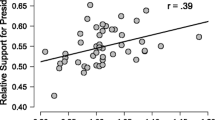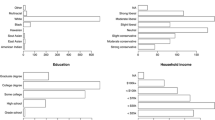Abstract
When two omnipotent beings are randomly and sequentially selecting positive integers, the being who selects second is almost certain to select a larger number. I then use the relativity of simultaneity to create a paradox by having omnipotent beings select positive integers in different orders for different observers.
Similar content being viewed by others
Notes
Certainty minus an infinitesimal.
In informal conversations.
Selection will be replaced by creation, to be defined as selection and display.
Albert Einstein, Relativity: The Special and the General Theory – A Popular Exposition (New York: Crown Publishers, 1961). In particular, see chapter 9, though my set-up differs slightly from Einstein’s.
As discussed above, the order of creation (selection and display) matches the order of observation.
As argued above.
I thank Mr. Cormier and Professor Levin for helpful, engaging discussion.
Author information
Authors and Affiliations
Corresponding author
Additional information
An erratum to this article can be found at http://dx.doi.org/10.1007/s11406-007-9043-2
Rights and permissions
About this article
Cite this article
Gwiazda, J. The Train Paradox. Philosophia 34, 437–438 (2006). https://doi.org/10.1007/s11406-006-9041-9
Received:
Accepted:
Published:
Issue Date:
DOI: https://doi.org/10.1007/s11406-006-9041-9




